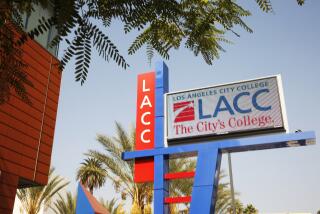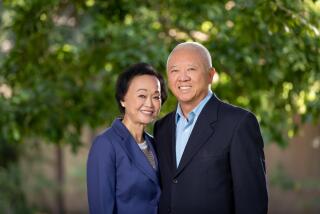Merage Makes It His Business to Help Others
The day he sold his food company for $2.6 billion, Paul Merage wanted to share his excitement with a friend. “I want to give back to America,” Merage told Marshall Kaplan, the former dean of the Graduate School of Public Affairs at the University of Colorado.
That was in October 2002. Three months later, Merage, whose company Chef America was best known for the Hot Pockets calzone-style frozen sandwiches, moved from Denver to Newport Beach and began giving away his money.
Wednesday, UC Irvine announced that Merage, a 61-year-old Iranian immigrant, would give the Graduate School of Management $30 million -- the largest donation ever given to the university -- and that the school would be renamed the Paul Merage School of Business.
For all his business acumen, Merage until Wednesday may have been better known in Orange County for his role in local culture and philanthropy. He is a board member and a leading donor for the Pacific Symphony. He sits on the board of the Orange County Performing Arts Center. He donated $3 million to the Jewish Community Center of Orange County, which bears the names of his mother and father.
He also has established four foundations and brought Kaplan from Colorado to run them.
One foundation has distributed 1,200 DVDs about immigrant success stories to high schools across the country and provides $20,000 stipends to graduating college students so they can pursue their American dream.
Another enlists retirees in Orange County to teach underprivileged preschool children and tries to persuade affluent retirees to donate their Social Security income to help them.
The Merage Foundation for U.S.-Israel Trade brings Israeli MBA students and executives to the United States for two- and three-week seminars in how to market to Americans.
In addition, Merage and his wife, Lilly, are paying for 15 poor children from the Orange County High School for the Performing Arts to attend an intensive summer course in filmmaking at Chapman University.
“I used to tell students he is a role model for what a business CEO should be, and if they have a cynicism based on what they’re hearing about the Enrons and the Tycos, Paul Merage is the perfect antidote,” Kaplan said. “He’s a man of impeccable integrity.”
Merage’s rabbi is not surprised by the businessman’s altruism.
“Paul has been so successful in business and gotten to the point in life where he wanted to give back in gratitude for being a successful immigrant and to inspire other immigrants and other Americans as well,” said Arnold Rachlis, rabbi at University Synagogue in Irvine.
Many of Merage’s views and values were framed by his immigrant experience -- coming to this country at 16 to study at Hope College in Holland, Mich., and then transferring to UC Berkeley, where he received his bachelor’s and MBA degrees.
“I was extremely pleasantly surprised to see that everyone I met [when I came to the U.S.] embraced me with open arms. I appreciate the generosity of spirit,” Merage said Thursday. “You can call me a patriot in the true sense of the word. I have seen what the world can be like elsewhere.”
Emigrating is almost a tradition in Merage’s family, although not always by choice. His great-grandfather was a rabbi in Azerbaijan who moved to Iran. His father was living in Paris when the Nazis marched in, and he fled back to Iran.
After receiving his MBA, Merage spent nine years at General Foods, Hunt Wesson and Specialty Foods. But his goal always was to have his own business.
He took out second and third mortgages on his house and borrowed money from his parents, and, along with his younger brother, started Chef America, selling frozen Belgian waffles to restaurants.
Asked to give the commencement speech at the UC Irvine business school last year, Merage used his company as a case study to demonstrate the “two most important pillars for success in business” -- vision and passion.
In his case, Merage said he spotted a trend, in 1983, of an increasing number of women entering the workforce that he thought he could capitalize on.
“Why not develop a frozen food product that kids and teenagers could heat themselves when Mom wasn’t at home?” he asked the graduates. “A hand-held product that could be eaten on the run.”
Because the company could not afford food scientists, Merage spent three years working in the waffle business by day and in his kitchen at night trying to come up with a product, using his family and friends as tasters.
The product turned out to be Hot Pockets, and Nestle SA bought the company in 2002 for $2.6 billion.
Merage said Thursday that business people need to be nimble in a world of socioeconomic, technological or geopolitical changes.
“A good businessman is aware of all these shifts and uses them to good advantage and moves on them real quickly,” he said. “You need to monitor this shift and know what it means to you and your customers.”
UCI’s business school is adopting this philosophy as part of its thematic approach, Dean Andrew Policano said, using the slogan “sustainable growth in the emerging innovation economy.”
Policano said that part of the MBA program would focus on emerging trends, with one course bringing in futurists, with students building strategies for company growth over the next three to five years.
“It’s exactly the way [Merage] approached the development of Hot Pockets,” the dean said.
More to Read
Inside the business of entertainment
The Wide Shot brings you news, analysis and insights on everything from streaming wars to production — and what it all means for the future.
You may occasionally receive promotional content from the Los Angeles Times.











